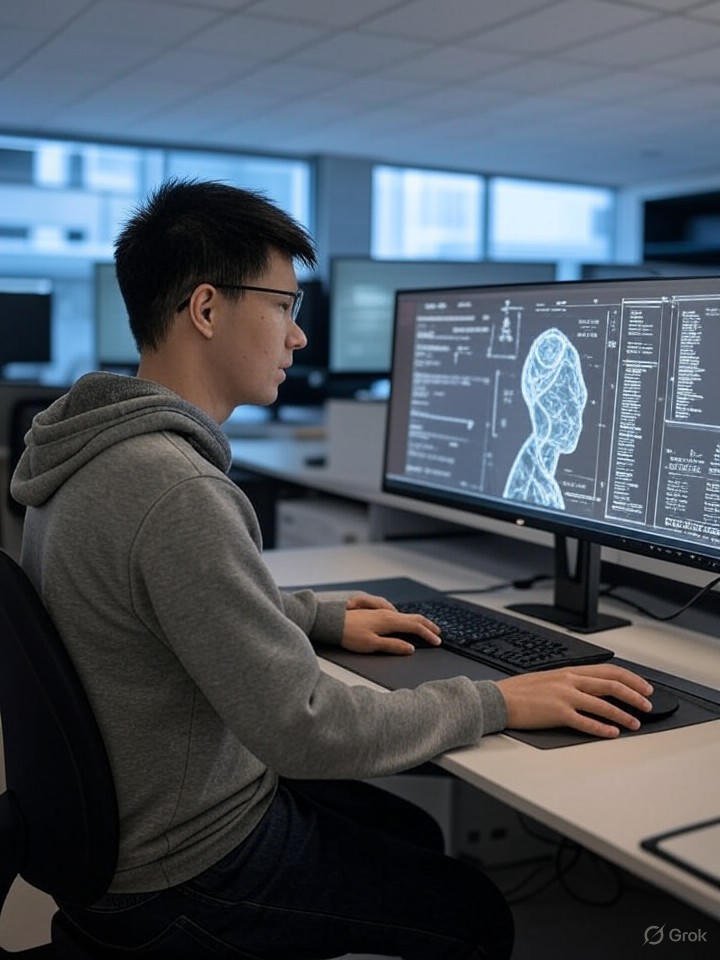AI Research
Under mounting pressure, Apple plans to increase its spending on artificial intelligence projects
Apple plans to ramp up its spending on artificial intelligence and take a more open approach to acquisitions as it faces mounting pressure from competitors and significant internal challenges.
During Apple’s latest earnings call, CEO Tim Cook announced that the company is investing significantly more in AI. Apple’s CFO Kevan Parekh added that much of the company’s current growth in spending is due to increased investment in AI.
Internally, Apple is shifting staff to AI-focused projects, aiming to integrate AI features across its platforms. The focus, according to the company, is on delivering personal, privacy-focused, and seamless user experiences. For infrastructure, Apple is relying on servers running its own chips under the name “Private Cloud Compute,” rather than hardware from vendors like Nvidia. Unlike Google or Microsoft, Apple doesn’t operate its own cloud infrastructure, instead using a hybrid model with partner solutions that are accounted for as operating expenses.
Apple’s cautious spending, but open to acquisitions
Cook also said Apple is open to acquisitions of any size if they support its AI strategy. So far this year, Apple has acquired around seven companies, mostly smaller firms, not all of which are AI-related. Apple’s largest acquisition to date was its $3 billion purchase of Beats Electronics in 2014.
Ad
Despite the increased spending, Apple remains conservative compared to other tech giants. The company invested $3.46 billion in capital expenditures during the June quarter, while Google, Meta, and Microsoft each plan to spend tens of billions. Cook also brushed off concerns that new AI devices could replace the iPhone, describing them as complementary rather than competitive.
Internal struggles and a shift in strategy
Apple’s announcement comes against a backdrop of serious internal issues. Reports point to technical setbacks and dysfunctional management that delayed the rollout of updated Siri features until 2026. Power struggles between John Giannandrea’s AI group and Craig Federighi’s software team reportedly stalled development, leading to a shakeup that put Federighi in charge of Siri. Apple has also struggled with a major shortage of computing power, forcing it to move away from its longstanding strategy of on-device data processing.
These problems triggered a massive talent exodus, with Meta luring away several key AI researchers with multimillion-dollar contracts. As a result, Apple is reportedly considering a major strategic shift, including talks with OpenAI and Anthropic about using their models for Siri. Under Federighi’s leadership, Apple is said to be open to integrating open-source models if they outperform its own efforts. The new investments and more flexible acquisition strategy appear to be Apple’s response to filling both strategic and personnel gaps.
AI Research
Chinese Startup DeepSeek Challenges Silicon Valley AI Dominance with Research Focus

In the rapidly evolving world of artificial intelligence, Chinese startup DeepSeek is emerging as a formidable player, prioritizing cutting-edge research over immediate commercial gains. Founded in 2023, the company has quickly gained attention for its innovative approaches to large language models, challenging the dominance of Silicon Valley giants. Unlike many U.S.-based firms that chase profitability through aggressive monetization, DeepSeek’s strategy emphasizes foundational advancements in AI architecture, drawing praise from industry observers for its long-term vision.
This focus on research has allowed DeepSeek to develop models that excel in efficiency and performance, particularly in training and inference processes. For instance, their proprietary techniques in sparse activation and optimized
AI Research
3 ways AI kiosks are rewriting the civic engagement playbook

Across the country, public agencies face a common challenge: how to deliver vital services equitably in the face of limited resources, rising expectations, and increasingly diverse populations.
Traditional government service models — centralized, bureaucratic, and often paper-based — struggle to keep pace with the needs of rural residents, multilingual communities and military families, whose mobility and time constraints demand flexibility.
But a new generation of civic infrastructure is beginning to take shape, one that blends artificial intelligence with physical access points in the communities that need them most. Intelligent self-service kiosks are emerging as a practical tool for expanding access to justice and other essential services, without adding administrative burden or requiring residents to navigate unfamiliar digital portals at home.
El Paso County, Texas, offers one compelling case study. In June 2024, the County launched a network of AI-enabled kiosks that allow residents to complete court-related tasks, from submitting forms and payments to accessing legal guidance, in both English and Spanish. The kiosks are placed in strategic community locations, including the Tigua Indian Reservation and Fort Bliss, enabling access where it’s needed most.
Three lessons from this rollout may prove instructive for government leaders elsewhere:
1. Meet People Where They Are…Literally
Too often, civic access depends on residents coming to centralized locations during limited hours. For working families, rural residents and military personnel, that model simply doesn’t work.
Placing kiosks in trusted, high-traffic locations like base welcome centers or community annexes removes that barrier and affirms a simple principle: access shouldn’t be an ordeal.
At Fort Bliss, for example, the kiosk allows service members to fulfill court-related obligations without taking leave or leaving the base at all. In just one month, nearly 500 military residents used the kiosk. Meanwhile, over 670 transactions have been completed on the Ysleta del Sur Pueblo (also known as the Tigua Indian Reservation), where access to public transportation is a challenge.
2. Design for Inclusion, Not Just Efficiency
While technology can streamline service delivery, it can also unintentionally exclude those with limited digital literacy or English proficiency. Multilingual A.I. interfaces and accessible user flows are both technical features and equity enablers.
In El Paso County, 20% of kiosk interactions have occurred in Spanish. This uptake highlights the importance of designing systems that reflect the communities they serve, rather than assuming one-size-fits-all access.
3. Think Beyond Digitization and Aim for Democratization
Many digital transformation efforts focus on moving services online, but that shift often leaves behind those without broadband, personal devices, or comfort with navigating complex websites. By embedding smart kiosks in the public realm, governments can provide digital tools without requiring digital privilege.
Moreover, these tools can reduce workload for front-line staff by automating routine transactions, freeing up human workers to focus on complex or high-touch cases. In that way, technology doesn’t replace the human element, it protects and supports it.
The El Paso County model is not the first of its kind, but its thoughtful implementation across geographically and demographically diverse communities offers a replicable roadmap. Other jurisdictions from Miami to Ottawa County, Michigan are piloting similar solutions tailored to local needs.
Ultimately, the path forward isn’t about flashy tech or buzzwords. It’s about pragmatism. It’s about recognizing that trust in government is built not through rhetoric but through responsiveness, and that sometimes, responsiveness looks like a kiosk in a community center that speaks your language and knows what you need.
For public officials considering a similar approach, the advice is simple: start with the barriers your residents face, then work backward. Let inclusion, not efficiency, guide your design. And remember that innovation in public service doesn’t always mean moving faster. Sometimes, it means stopping to ask who’s still being left behind.
Pritesh Bhavsar is the founding technology leader at Advanced Robot Solutions.
AI Research
GEAT) Announces Official Re-Launch of Wall Street Stats Mobile Applications with Advanced AI and Machine Learning Features
RENO, Nev., Sept. 02, 2025 (GLOBE NEWSWIRE) — GreetEat Corporation (OTC: GEAT), a forward-thinking technology company dedicated to building next-generation platforms, today announced the official re-launch of its subsidiary Wall Street Stats (WallStreetStats.io) applications on both iOS and Android. The updated apps deliver a powerful suite of new tools designed to empower investors with deeper insights, smarter analytics, and a cutting-edge user experience.
The new release introduces an upgraded platform driven by artificial intelligence and machine learning, providing users with:
- Detailed Quotes & Company Profiles – Comprehensive financial data with intuitive visualization.
- Summarized Market Intelligence – AI-powered data aggregation and automated summarization for faster decision-making.
- Sentiment Analysis via Reddit & Social Platforms – Machine learning models that detect, classify, and quantify investor sentiment in real time.
- Trending Stocks, Top Gainers, Top Losers, and Most Active Lists – AI-curated market movers updated dynamically throughout the day.
- Smart Watchlists – Personalized watchlists enhanced by predictive analytics and recommendation algorithms.
- AI-Driven Market Predictions – Leveraging natural language processing (NLP), deep learning, and behavioral pattern recognition to uncover emerging investment opportunities.
“Wall Street Stats was designed to go beyond traditional financial data and offer an AI-first experience that empowers both retail and professional investors,” said Victor Sima, CTO of GreetEat Corporation. “With this re-launch, we’ve combined the best of real-time market intelligence with machine learning powered insights that make data more actionable, intuitive, and predictive. This is just the beginning of our vision to democratize Wall Street – level analytics for everyone.”
The platform’s enhanced features are aimed at giving investors a competitive edge by uncovering hidden patterns, predicting momentum, and providing smarter investment signals. With natural language processing, predictive modeling, and real-time data analytics, Wall Street Stats represents a new era in financial technology innovation.
The applications are now available for download on both the Apple App Store and Google Play Store.
About GreetEat Corporation
GreetEat Corporation (OTC: GEAT) is a technology-driven platform designed to bring people together through virtual dining. Whether for business meetings, celebrations, or personal connections, GreetEat blends video conferencing with meal delivery to create meaningful, shared experiences anywhere in the world. In addition to GreetEat.com, the company also owns WallStreetStats.io, a cutting-edge fintech app that leverages AI and machine learning to analyze social sentiment, market trends, and trading signals in real time, available on both Android and iOS stores.
For Investor Relations or Media Inquiries:
GreetEat Corporation
Email: investors@GreetEat.com
Website: www.GreetEat.com
Connect with GreetEat Corporation
Website: www.GreetEat.com
Website: www.WallStreetStats.io
Follow us on social media:
Follow us on social media:
Download the apps with the below links:
Apple App Store and Google Play Store.
Forward-Looking Statements: This press release contains forward-looking statements within the meaning of the Private Securities Litigation Reform Act of 1995. These forward-looking statements are based on current expectations, estimates, and projections about the company’s business and industry, management’s beliefs, and certain assumptions made by the management. Such statements involve risks and uncertainties that could cause actual results to differ materially from those in the forward-looking statements. The company undertakes no obligation to update or revise any forward-looking statements, whether as a result of new information, future events, or otherwise.

-

 Business4 days ago
Business4 days agoThe Guardian view on Trump and the Fed: independence is no substitute for accountability | Editorial
-
Tools & Platforms3 weeks ago
Building Trust in Military AI Starts with Opening the Black Box – War on the Rocks
-

 Ethics & Policy1 month ago
Ethics & Policy1 month agoSDAIA Supports Saudi Arabia’s Leadership in Shaping Global AI Ethics, Policy, and Research – وكالة الأنباء السعودية
-

 Events & Conferences3 months ago
Events & Conferences3 months agoJourney to 1000 models: Scaling Instagram’s recommendation system
-

 Jobs & Careers2 months ago
Jobs & Careers2 months agoMumbai-based Perplexity Alternative Has 60k+ Users Without Funding
-

 Funding & Business2 months ago
Funding & Business2 months agoKayak and Expedia race to build AI travel agents that turn social posts into itineraries
-

 Education2 months ago
Education2 months agoVEX Robotics launches AI-powered classroom robotics system
-

 Podcasts & Talks2 months ago
Podcasts & Talks2 months agoHappy 4th of July! 🎆 Made with Veo 3 in Gemini
-

 Education2 months ago
Education2 months agoAERDF highlights the latest PreK-12 discoveries and inventions
-

 Podcasts & Talks2 months ago
Podcasts & Talks2 months agoOpenAI 🤝 @teamganassi





















